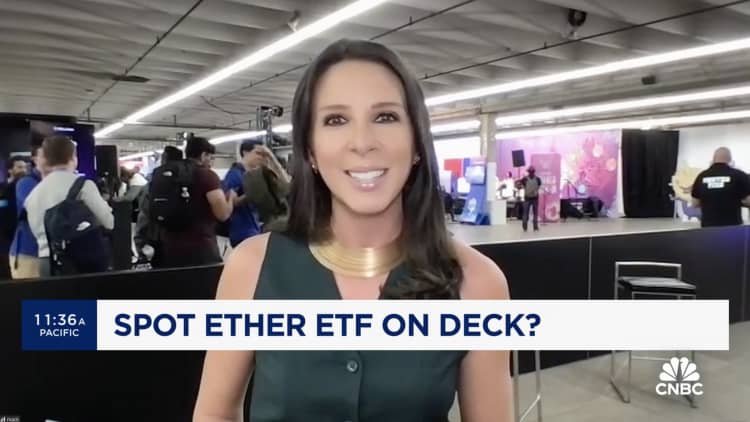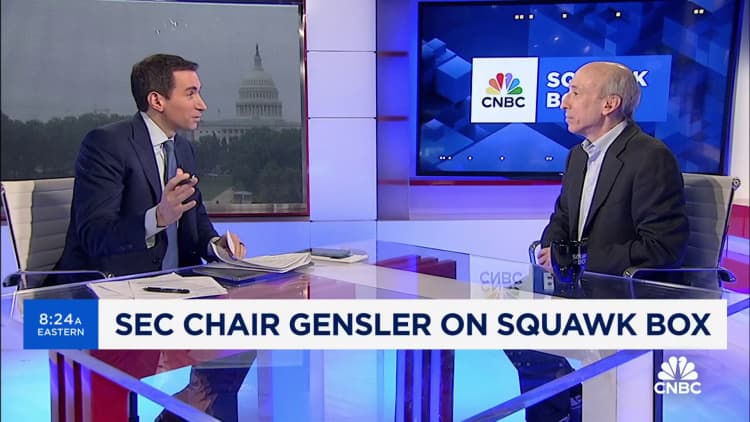
For years, the Securities and Exchange Commission has been cracking down on the crypto sector writ large, but in the last few months, the agency appears to have trained its sights on ethereum, in particular. Some of the biggest names in decentralized finance are now fighting back.
In a 40-page filing Tuesday, Uniswap Labs — which builds decentralized finance infrastructure including a popular DeFi crypto exchange that enables users to custody their own coins — detailed to the SEC all the reasons why the agency shouldn't pursue legal action against them. It comes a few weeks after the commission issued Uniswap a Wells notice, warning the company that it identified potential violations of U.S. securities law.
"The SEC's entire case rests on the false assumption that all tokens are securities. Tokens are in fact, simply a file format for value," said Uniswap's chief legal officer, Marvin Ammori.
"The SEC has to essentially unilaterally change the definitions of exchange, broker and investment contract in order to try to capture what we do,“ Ammori said.
A Wells notice is typically one of the final steps before the SEC formally issues charges. It generally lays out the framework of the regulatory argument and offers the potentially accused an opportunity to rebut the SEC's claims.
So far this year, the federal regulator has sent Wells notices, filed lawsuits, or reached settlements with a host of crypto firms, and the SEC's legal challenges are increasingly focused on ethereum and players working in decentralized finance, including ShapeShift, TradeStation, Uniswap and Consensys. It also comes as the agency is reportedly investigating the Ethereum Foundation.
CNBC reached out to the SEC about the recent batch of Wells notices sent to crypto firms, and an agency spokesperson declined to comment.
In April, Consensys tried to preempt the SEC's action with its own lawsuit, alleging overreach on the part of the regulator. The 10-year-old crypto firm said its suit followed three subpoenas issued last year, plus a Wells notice from the SEC that claimed the company was violating federal securities laws.
"This action is about the almost certainty that we hold that the SEC is trying to slow or kill ethereum, decentralization, disintermediation and disintermediated technology in the U.S., and probably wouldn't stop there with its long arm," said long-time ethereum veteran Joseph Lubin, who went from co-founding the blockchain to launching and running Consensys.
"It might influence other nation-states to do similarly draconian things," continued Lubin.
Security vs. commodity
The recent spate of actions targeting major names working in the ethereum ecosystem comes ahead of a long-awaited decision on whether the regulator will approve or deny applications to launch spot ether exchange-traded funds.
To date, the agency's stance on ether's classification as either a commodity or a security remains uncertain.
"We think big banks like the way things are organized. We think certain factions of the U.S. government like the way they operate," said Lubin. “Without explicitly stating their intentions, without public discussion and clear rulemaking, the SEC seems to have decided to reclassify ether as a security without being able to utter that that's what they're doing."
The industry argues if ether — the native token of the ethereum blockchain — gets classified as a security, it could throw the future of the ethereum network and many adjacent crypto firms into question. Exchanges, both centralized and decentralized, would be forced to choose between registering with the SEC, or delisting ether altogether.
"If the SEC, in fact, does take the position that ethereum is a security, pretty much everyone in this business that is using or providing services of the ethereum blockchain, they're going to be on notice that they might need to be registered," said digital assets attorney Christopher Gerold, who previously served as the chief of the New Jersey Bureau of Securities.
"Whatever protections they thought they had before are no longer going to be there, and we're going to see a shift in the industry," continued Gerold.

The head of litigation and investigations at Consensys told CNBC that the firm's been alarmed that the SEC has been targeting developers.
"They asked for a list of the names of any Consensys developers who contributed any coding to the merge," said Laura Brookover.
The so-called merge was a years-in-the-making systemwide upgrade to the ethereum blockchain that took effect in September 2022 and changed the way transactions are verified. The proof-of-stake model, which replaced the proof-of-work model, requires volunteers on the network to put up their ether tokens, or "stake" them, in order to secure the network.
Brookover says the agency has explicitly asked for the identities of public and private Consensys software developer code repositories.
"Those are very strange requests from a financial regulator," continued Brookover. "I can speak to that, because I used to be in the CFTC's enforcement division and investigated cases myself."
Multiple coders and industry executives have told CNBC that it is possible the SEC could be taking more of an interest in ethereum, because the regulator thinks its native token functions more like a security after the merge.
Brookover told CNBC that the Consensys suit asks the court to declare both that ether is not a security and that the SEC lacks jurisdiction to investigate ethereum. Ultimately, the regulator will have to respond to the Consensys complaint in a legal filing.
"They're going to be hard pressed not to say in their answer whether they think ethereum is a security or not," said Gerold, adding that he suspects that the agency will take the position that it is a security because of the proof-of-stake change that took effect two years ago.
One thing the SEC has been clear on is its classification of bitcoin as a commodity. With ether, the narrative has changed.
In 2018, when Bill Hinman was still the director of the Securities and Exchange Commission's Division of Corporation Finance, he told CNBC that, "When we look at bitcoin or if we look at ether and the highly decentralized nature of the networks, we don't see a third-party promoter where applying the disclosure regime would make a lot of sense."
"So we're comfortable ... viewing these as items that don't have to be regulated as securities," continued Hinman.
In April 2023, when Rep. Patrick McHenry, R-N.C., asked SEC Chair Gary Gensler whether ether was a commodity or a security, Gensler demurred.

SEC vs. crypto
Gensler has, in multiple interviews, repeatedly shared that he believes much of the industry already belongs under its jurisdiction, and its lawsuits are simply bringing the industry under compliance. Crypto firms argue that the recent legal battles haven't given the regulatory clarity the industry has been seeking for years.
With the Uniswap Wells notice, for example, a source at the company told CNBC that dealing with the SEC was akin to "talking to a wall."
For two years preceding the Wells notice, Uniswap described the protracted interactions with the agency as an opaque process that involved responding to multiple requests, including giving testimony and sending several documents to the agency, without getting much feedback about the regulator’s concerns around potential wrongdoing. This source also told CNBC they had not heard from the regulator at all in 2024 until the agency told them in a half-hour phone call that they would be receiving a formal notice.

Both Consensys and Uniswap suggest the SEC's broad approach to classifying securities may be outdated.
"The SEC is arguing that the Uniswap protocol is an unregistered securities exchange, and that the Uniswap interface and wallet are both unregistered broker brokers," Ammori said.
But Uniswap argues that the protocol itself is a general purpose computer program that anyone can use and integrate.
"So the protocol is not an exchange also, because under the law, it would have to be specifically designed for securities trading, and it is not," continued Ammori.
Uniswap argues in its response to the SEC that the majority of its trading volume is obvious nonsecurities, like ether, bitcoin and stablecoins.
"It's not run by a group, as the definition requires, but as autonomous software no person or group controls," added Ammori.
"The SEC knows that the current definition of exchange does not cover the protocol, or anything we do. That's why as we speak, there's a pending rulemaking, for the SEC is trying to redefine about a half dozen words in their own regulations to try to capture us," continued Uniswap's chief legal officer.
Alma Angotti, partner and global legislative and regulatory risk leader at the consulting firm Guidehouse, cautions that it is less clear whether decentralized exchanges function like an alternative trading system, or a market maker — or whether they really are just a technology that does not act as a broker-dealer.
Meanwhile, as the SEC ramps up its focus on decentralized players in the crypto ecosystem, centralized players also remain under scrutiny by the regulator.
In May, investment platform Robinhood announced it received a Wells notice for the company's crypto operations. The SEC has also sued Coinbase and Binance. With multiple pending legal challenges from the regulator and enduring uncertainty about the future of crypto regulation in the U.S., multiple crypto businesses have said they are considering decamping from the country altogether.
"We've got companies that are wasting resources trying to figure out, 'Am I a broker-dealer? Are these assets securities?'" said Binance's former chief compliance officer, Christina Rea.
"We're already having a hard enough time trying to get them to be compliant with other important laws — anti-money-laundering laws, anti-bribery and corruption laws."
On Thursday, the commission will issue a decision on whether to approve one of the spot ether ETF applications after a multimonth delay. Many are waiting to see whether the regulator will offer clarity on its stance on ether.
— CNBC's Jordan Smith contributed to this report.







